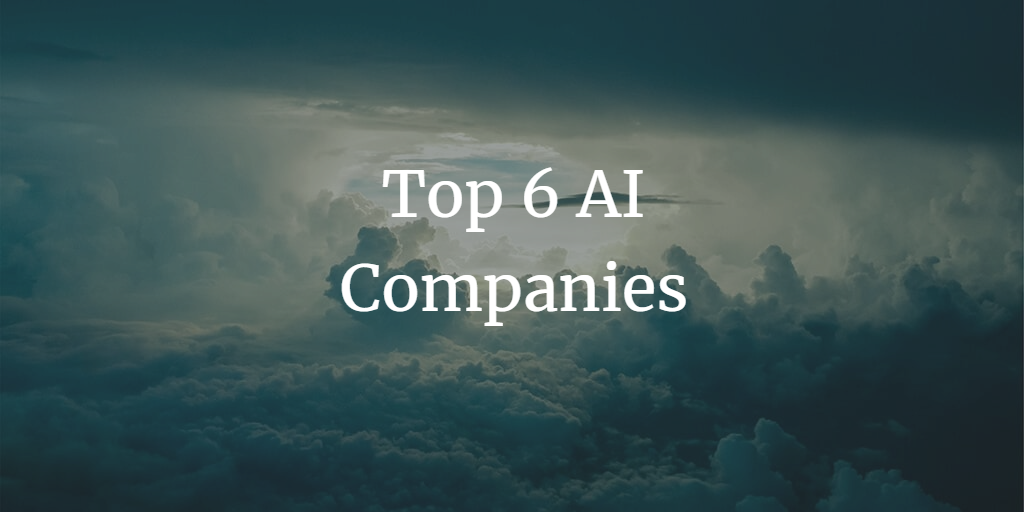The Top 6 AI Companies to Watch: Innovating Industries and Advancing AI Technology

Table of Contents
Introduction
Understanding the Impact of AI
Top 6 AI Companies to Watch in 2023
OpenAI
DeepMind
Tempo
Cerebras Systems
H2O.ai
DataRobot
The Future of AI: What to Expect
Deep Dive into AI Innovations
AI Ethics and Regulations: The Road Ahead
Conclusion
Introduction
Artificial Intelligence (AI) has drastically transformed industries and societies over the past decade. From autonomous vehicles to AI-powered medical diagnostics, the influence of AI can be seen in every sphere of life. In this blog post, we'll explore six companies leading the AI revolution. These companies are not just incorporating AI into their products and services, but they are shaping the future of AI itself.
Understanding the Impact of AI
The proliferation of AI technology has changed the way businesses operate and deliver value to their customers. In healthcare, AI algorithms can predict the onset of diseases, analyze radiology images, and even assist in drug discovery. In finance, AI powers fraud detection systems, predictive analytics for investment, and personalized banking services.
Even everyday activities are influenced by AI. The recommended products on your online shopping app, the personalized playlist on your music streaming service, or the optimal route suggested by your map application are all powered by AI.
In this dynamic landscape, several companies are emerging as leaders in AI technology, constantly innovating and pushing the boundaries of what AI can achieve.
Top 6 AI Companies to Watch in 2023
OpenAI
Founded by Elon Musk, Sam Altman, and other prominent tech leaders, OpenAI's mission is to ensure that artificial general intelligence (AGI) benefits all of humanity. The company's commitment to long-term safety and technical leadership has resulted in the development of several impressive AI technologies.
One of OpenAI's notable projects is GPT-3, a language prediction model that can write essays, answer questions, and even create poetry. OpenAI has also developed technologies in areas like robotics and reinforcement learning, demonstrating a broad and ambitious approach to AI research.
DeepMind
A subsidiary of Alphabet Inc., DeepMind has a reputation for creating AI systems that can achieve remarkable feats. Its AI program AlphaGo made headlines when it defeated a world champion Go player, a feat previously thought to be decades away.
DeepMind is also making significant contributions to AI research. Its AlphaFold system was recognized as a solution to the protein-folding problem, a grand challenge in biology, demonstrating the incredible potential of AI to advance science.
Tempo
Tempo is an exciting startup that's pioneering the concept of AI factories. By integrating AI into the manufacturing process, Tempo aims to create more efficient, adaptable, and sustainable production systems. Their technology could revolutionize industries like consumer electronics, automotive, and aerospace by drastically reducing the time and cost of producing high-quality products.
Cerebras Systems
Pushing the boundaries of AI hardware, Cerebras Systems has developed the world's largest computer chip specifically designed for AI workloads. Their groundbreaking Wafer Scale Engine (WSE) vastly outperforms conventional hardware in speed and efficiency, enabling more complex and capable AI systems. By innovating at the hardware level, Cerebras is helping to drive the next generation of AI technology.
H2O.ai
H2O.ai is democratizing AI by making it accessible to businesses of all sizes. Their automatic machine learning platform, H2O Driverless AI, empowers companies to implement AI solutions without needing a team of expert data scientists. H2O.ai is also committed to open-source software, contributing to the development of the AI community.
DataRobot
DataRobot is pioneering the field of automated machine learning. Their platform allows users to build and deploy machine learning models quickly and easily, even without extensive data science knowledge. By simplifying the process of implementing AI, DataRobot is enabling more businesses to harness the power of AI and make data-driven decisions.
The Future of AI: What to Expect
As we've seen, these six companies are shaping the AI landscape through their groundbreaking research, innovative products, and commitment to making AI accessible to all. Their work is contributing to a future where AI plays an even more significant role in our lives and societies.
Looking ahead, we can expect several developments in AI:
More advanced AI models: With the evolution of machine learning techniques and improvements in AI hardware, we can anticipate the emergence of even more sophisticated AI models. These models will be capable of understanding and generating human language with increasing accuracy, recognizing patterns in vast datasets, and making predictions with unprecedented precision.
Widespread use of AI in various industries: As AI technology becomes more accessible and understandable, we can expect its adoption across various sectors to accelerate. Industries like healthcare, finance, manufacturing, and retail are already embracing AI, and we can expect others to follow suit.
Ethical and regulatory developments: As AI becomes more integrated into our lives and societies, ethical and regulatory issues will come to the fore. Issues around data privacy, AI bias, and the impact of AI on employment will need to be addressed, likely leading to new regulations and standards for AI.
Deep Dive into AI Innovations
Given the transformative power of AI, let's dive deeper into some of the innovative technologies and approaches that these leading companies are employing to advance AI and reshape industries.
OpenAI and Language Models
OpenAI's GPT-3 is not just another AI model; it represents a significant leap forward in the ability of AI to understand and generate human language. GPT-3 can write essays, answer questions, translate languages, and even create poetry. This is possible due to a technique called transformer neural networks, which allows the model to understand the context of words and sentences.
In the future, we could see even more advanced versions of language models like GPT-3, capable of tasks like real-time translation, drafting legal documents, writing code, and more.
DeepMind and Reinforcement Learning
DeepMind's success in creating AI programs that can master complex games like Go and chess comes from a technique called reinforcement learning. In reinforcement learning, an AI model learns to perform tasks by receiving rewards for successful actions and penalties for mistakes.
This approach allows AI models to learn from experience and adapt their strategies over time. Looking ahead, reinforcement learning could be used in a variety of applications, such as optimizing logistics, managing energy grids, and even personalized learning.
Tempo and AI Factories
Tempo's concept of an AI factory represents a new approach to manufacturing. By integrating AI into the manufacturing process, factories can optimize production schedules, improve quality control, and adapt quickly to changes in demand.
In the future, we could see more industries adopting the concept of AI factories, leading to more efficient and sustainable production systems.
Cerebras Systems and AI Hardware
Cerebras Systems' Wafer Scale Engine (WSE) demonstrates the importance of hardware in AI development. By creating a computer chip specifically designed for AI workloads, Cerebras is enabling more complex and capable AI systems.
As AI models become more advanced, we can expect further innovations in AI hardware to keep pace. These could include new types of computer chips, more efficient data centers, and even quantum computers.
H2O.ai and Democratization of AI
H2O.ai's mission to make AI accessible to businesses of all sizes represents a significant trend in the AI field — the democratization of AI. Their automatic machine learning platform, H2O Driverless AI, allows companies to implement AI solutions without a team of expert data scientists.
This trend towards democratization is likely to continue, with more user-friendly AI tools and platforms emerging. These tools will enable businesses to leverage AI, even without extensive in-house AI expertise, leading to more widespread adoption of AI across industries.
DataRobot and Automated Machine Learning
DataRobot's platform showcases the power of automated machine learning. By simplifying the process of building and deploying machine learning models, DataRobot allows businesses to harness the power of AI quickly and easily.
In the future, we can anticipate further advancements in automated machine learning, making AI even more accessible and usable. Companies will be able to implement AI solutions faster, with fewer resources, driving increased productivity and innovation.
AI Ethics and Regulations: The Road Ahead
As these companies continue to push the boundaries of AI, ethical and regulatory issues will become increasingly important. Key areas to watch include:
Data Privacy: With AI models relying on vast amounts of data, protecting the privacy of individuals is a key concern. Companies will need to develop robust data privacy policies and invest in technologies that allow AI models to learn from data without compromising privacy.
AI Bias: AI models can inadvertently perpetuate or even amplify societal biases present in their training data. Companies will need to develop strategies to detect and mitigate bias in their AI models, ensuring that their AI systems are fair and equitable.
AI Governance: As AI becomes more integrated into our societies, there will be increasing demand for clear regulations and standards around AI. This could lead to the establishment of regulatory bodies to oversee the use of AI, similar to the regulatory bodies that exist for industries like pharmaceuticals and aviation.
Conclusion: The Ever-Evolving Landscape of AI
Artificial intelligence continues to reshape our world in profound ways. As we delve into the accomplishments and ongoing initiatives of these top AI companies, it's evident that the future holds even more transformative potential.
OpenAI, DeepMind, Tempo, Cerebras Systems, H2O.ai, and DataRobot are at the forefront of AI innovation. As we continue to keep an eye on their progress and the broader evolution of AI, one thing is clear - AI is not just a tool but a key driver of the new age of creativity at scale.
These companies illustrate the immense potential of AI to drive innovation and transform industries. As we continue to watch their progress, we can look forward to a future where AI technology is even more integrated into our lives, bringing new levels of efficiency, creativity, and capability.


